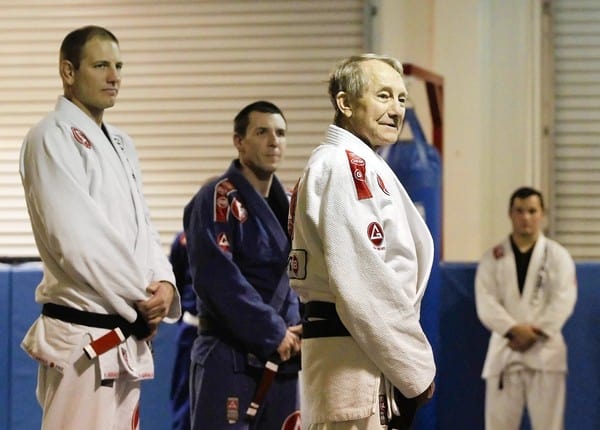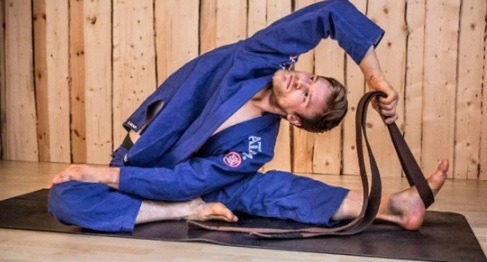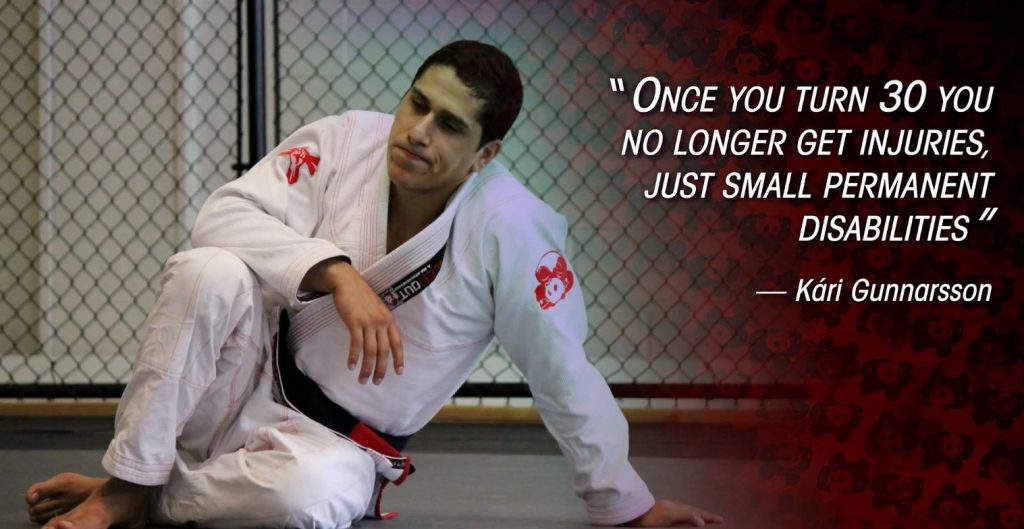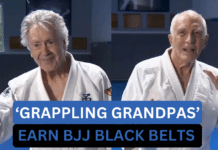
Brazilian Jiu-Jitsu is a contact sport. In the world of martial arts, that would translate to an ability for full-on training up to a certain age. Usually, the cut off age is somewhere between 30 and 40 years old. And yet, In BJ, we see people well in their 50s and 60s, and even older, still training. And not just training, but also actively doing sparring and some even competing. What’s the catch here? What makes Brazilian Jiu-Jitsu different from other full-contact martial arts? In all honesty, the same rules apply. Not everyone gets to still actively train at 80 years of age. However, there is a way for everyone to achieve such a feat. Longevity in BJJ does not just mean being ablet o train for a lifetime but train every aspect of the sport for a lifetime. And there are certain guidelines to help you get there.
Longevity in BJJ is like this mystical thing that people talk about but can’t really explain it to each other. That is mostly true for younger athletes that have heard of longevity but do not pay much attention to it. That’s precisely why certain folks won’t get the chance to train for a lifetime. It is too late to start thinking about longevity in BJJ when you’re 40 years old, with a few chronic injuries and family at home to take care of. What you should do, if you’re serious about being a lifetime grappler, is to jump on the longevity bandwagon as early as possible. That way, you’ll train in a way that will ensure you can still move and perform like a young grappler, even when you become an OG.
Training Brazilian Jiu-Jitsu For Life

If you want to train BJJ for life, you need to have a cerebral approach to it. Even if your goal is to become a top-shelf competitor, you still need to think about yourself first. If your body does not work, you’ll miss out on more in your life than just Brazilian Jiu-Jitsu. Longevity in BJJ means you need to become a thinker Monkey rather than a gorilla trying to smash its way through everything.
A great example of this is “the Masters Competitors” phenomenon. Young athletes usually enter tournaments all hyped up and go at it like there is no tomorrow. On the other hand, in the master’s division, even if it is white belts, people tend to be much more laid back, respectful and watch out for each other. Of course, this is not a universal rule, but it is what tends to happen more often than not. You want to approach BJJ in general as a masters competitor, rather than an adult. Rafael Lovato Jr. had a nice funny video representing this approach posted on his Facebook page.
Longevity In BJJ: Building A Long Term Game
Let’s talk longevity in BJJ a bit more specifically. You have to have a lot of things under your control outside of the gym, but it is essentially what you do on the mats that’ll define how long you can train BJJ for. And by train, I mean roll with as many people as possible, as often as possible.
Think of longevity in BJJ as an investment. Adopting the longevity approach as a younger grappler might not yield great results immediately. Just like in an investment, it will take time for things to pay off, but when they do, the returns will be Multifold. And do not worry about not being able to play to your strengths – the BJJ longevity gameplan is just as effective, if not more, than that of athletically gifted grapplers.
Namely, young people’s BJJ game is often marked by certain very specific attributes. They have a lot to do with age and athletic abilities that come with it. They tend to be fast, strong, explosive, have massive as tanks, crazy flexibility, and the likes. All of these can offer way out of bad spots or make attacks work better. However, that doesn’t mean your Jiu-Jitsu gets better. The longevity approach would have you play a game that doesn’t’ rely on any of these abilities, despite the fact you might have them all now. One day in the distant future, you’ll run out of those abilities and you’ll need something to fall back onto.
In more technical terms, for longevity in BJJ, you should stay grounded. Literally. That means avoiding all acrobatic moves, inversions, spins, flying submissions, etc. Keep things simple and technical, trying to submit people while not even breaking a sweat. That is what real Jiu-Jitsu is about.
Key BJJ Longevity Lessons
The best lessons are learned through other people’s struggles. However, when you learn one through your own, you tend to remember it much better. In a quest for longevity in BJJ, I’ve used both. All of these lessons learned have greatly influenced my game, taking my BJJ to another level while offering me a way to be able t train despite age, injuries or just the insane pace of daily life.

The rolling formula that works for a lifetime is to remove all kinds of panic reactions from your game. Accept everything that happens in a roll, good or bad and work your way out calmly and methodically. Also, tapping out early and often can add years to your time in BJJ. Even if you’re tapping because of a position rather than a submission.
There are a few more things that define longevity in BJJ. Picking your training (and particularly rolling) partners carefully is one. Focusing on minimalism and defending everything before you attack is another. Make your partners tired before you go for the kill.
Finally, what you do out of the gym also matters a lot. Nutrition and recovery are key here and are much more important than any type of strength training or conditioning.
In Conclusion
If you want to train Brazilian Jiu-Jitsu for the rest of your life, you need to see it as a game. Take BJJ too seriously, and it will destroy your body in the long run. Instead, opt to play around, particularly when you’re rolling. Try and figure out why and how things in BJJ work, rather than trying to submit everyone multiple times in a roll. This is a proven recipe for longevity in BJJ that will allow you to train as long as Helio Gracie did. Who knows, you might even surpass him!


![Darce Choke Encyclopedia – Origins, Mechanics and Variations [2024] BJJ, choke, Brabo, BJJ Darce Choke, D'arce Choke, Darce BJJ Choke](https://bjj-world.com/wp-content/uploads/2017/11/JungPoirierLeeYahoo-218x150.jpg)









![Best Marcelo Garcia Techniques by Team Marcelo Garcia DVD Review [2025] Best Marcelo Garcia Techniques by Team Marcelo Garcia DVD Review](https://bjj-world.com/wp-content/uploads/2025/02/best-marcelo-garcia-techniques-dvd-review-218x150.png)
![Forging The De La Riva Guard Giancarlo Bodoni DVD Review [2025]](https://bjj-world.com/wp-content/uploads/2025/02/de-la-riva-guard-giancarlo-bodoni-dvd-review-218x150.png)

![Breaking Their Guard Mikey Musumeci DVD Review [2025] Breaking Their Guard Mikey Musumeci DVD Review](https://bjj-world.com/wp-content/uploads/2025/02/breaking-their-guard-mikey-musumeci-dvd-review-218x150.png)

![Double Sleeve Guard Jon Thomas BJJ DVD Review [2024] Double Sleeve Guard Jon Thomas BJJ DVD Review](https://bjj-world.com/wp-content/uploads/2024/10/double-sleeve-guard-jon-thomas-bjj-dvd-review-324x235.png)

![Gracie Secrets Closed Guard Kyra Gracie DVD Review [2024] Gracie Secrets Closed Guard Kyra Gracie DVD Review](https://bjj-world.com/wp-content/uploads/2024/12/closed-guard-kyra-gracie-dvd-review-100x70.png)

![Breaking Their Guard Mikey Musumeci DVD Review [2025] Breaking Their Guard Mikey Musumeci DVD Review](https://bjj-world.com/wp-content/uploads/2025/02/breaking-their-guard-mikey-musumeci-dvd-review-100x70.png)

![Daisy Fresh WHITE BELT Wrestling Curriculum DVD Review [2024] Daisy Fresh WHITE BELT Wrestling Curriculum DVD Review](https://bjj-world.com/wp-content/uploads/2024/10/daisy-fresh-white-belt-wrestling-curriculum-review-100x70.png)
![Reverse De La Riva System Mikey Musumeci DVD Review [2024] Reverse De La Riva System Mikey Musumeci DVD Review](https://bjj-world.com/wp-content/uploads/2024/11/reverse-de-la-riva-system-mikey-musumeci-dvd-review-100x70.png)
![Grappling Takedown Dominance Brandon Ruiz DVD Review [2025] Grappling Takedown Dominance Brandon Ruiz DVD Review](https://bjj-world.com/wp-content/uploads/2025/01/grappling-takedown-dominance-brandon-ruiz-dvd-review-100x70.png)



![Baby Shark Guard System Diogo Reis DVD Review [2025] Baby Shark Guard System Diogo Reis DVD Review](https://bjj-world.com/wp-content/uploads/2025/02/baby-shark-guard-system-diogo-reis-dvd-review-100x70.png)



![Ginastica Natural Alvaro Romano DVD Review [2024] Ginastica Natural Alvaro Romano DVD Review](https://bjj-world.com/wp-content/uploads/2024/12/ginastica-natural-alvaro-romano-dvd-review-100x70.png)
![Full Guard Formula James Booth DVD Review [2025] Full Guard Formula James Booth DVD Review](https://bjj-world.com/wp-content/uploads/2025/02/full-guard-formula-james-booth-dvd-review-100x70.png)


![Top Half Guard Neil Melanson DVD Review [2025] Top Half Guard Neil Melanson DVD Review](https://bjj-world.com/wp-content/uploads/2025/02/top-half-guard-neil-melanson-dvd-review-100x70.png)



![Crush The Guard Vagner Rocha DVD Review [2024] Crush The Guard Vagner Rocha DVD Review](https://bjj-world.com/wp-content/uploads/2024/10/crush-the-guard-vagner-rocha-dvd-review-100x70.png)
![Wrestling For Jiu-Jitsu Shawn Williams DVD Review [2025] Wrestling For Jiu-Jitsu Shawn Williams DVD Review](https://bjj-world.com/wp-content/uploads/2025/01/wrestling-for-jiu-jitsu-shawn-williams-dvd-review-100x70.png)
![Front Headlock and Turtle Escapes Brian Glick DVD Review [2024] Front Headlock and Turtle Escapes Brian Glick DVD Review](https://bjj-world.com/wp-content/uploads/2024/11/headlock-and-turtle-escapes-brian-glick-dvd-review-100x70.png)
![Advanced Immortal Clinch Matt Brown DVD Review [2024] Advanced Immortal Clinch Matt Brown DVD Review](https://bjj-world.com/wp-content/uploads/2024/09/advanced-immortal-clinch-matt-brown-dvd-review-100x70.png)